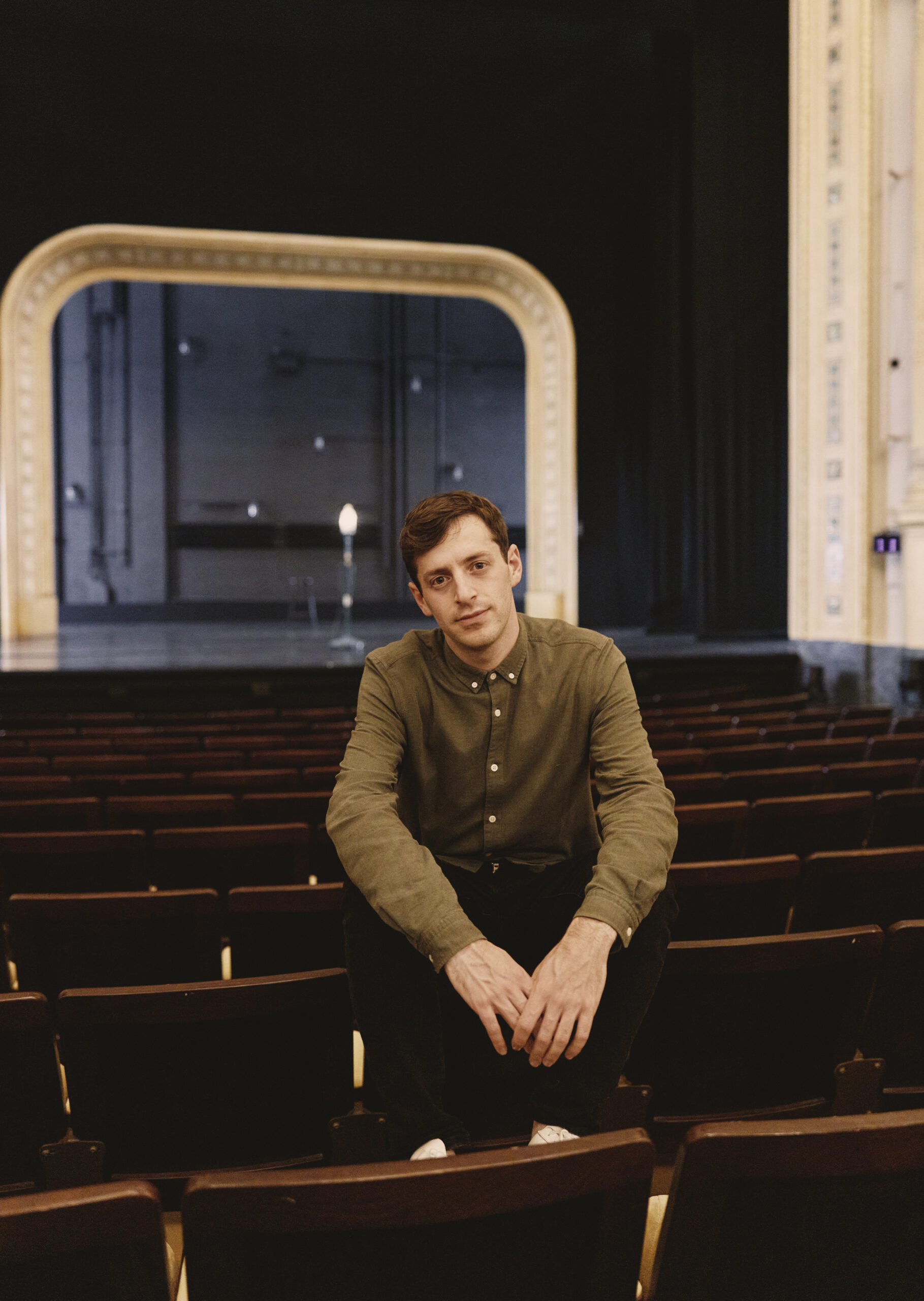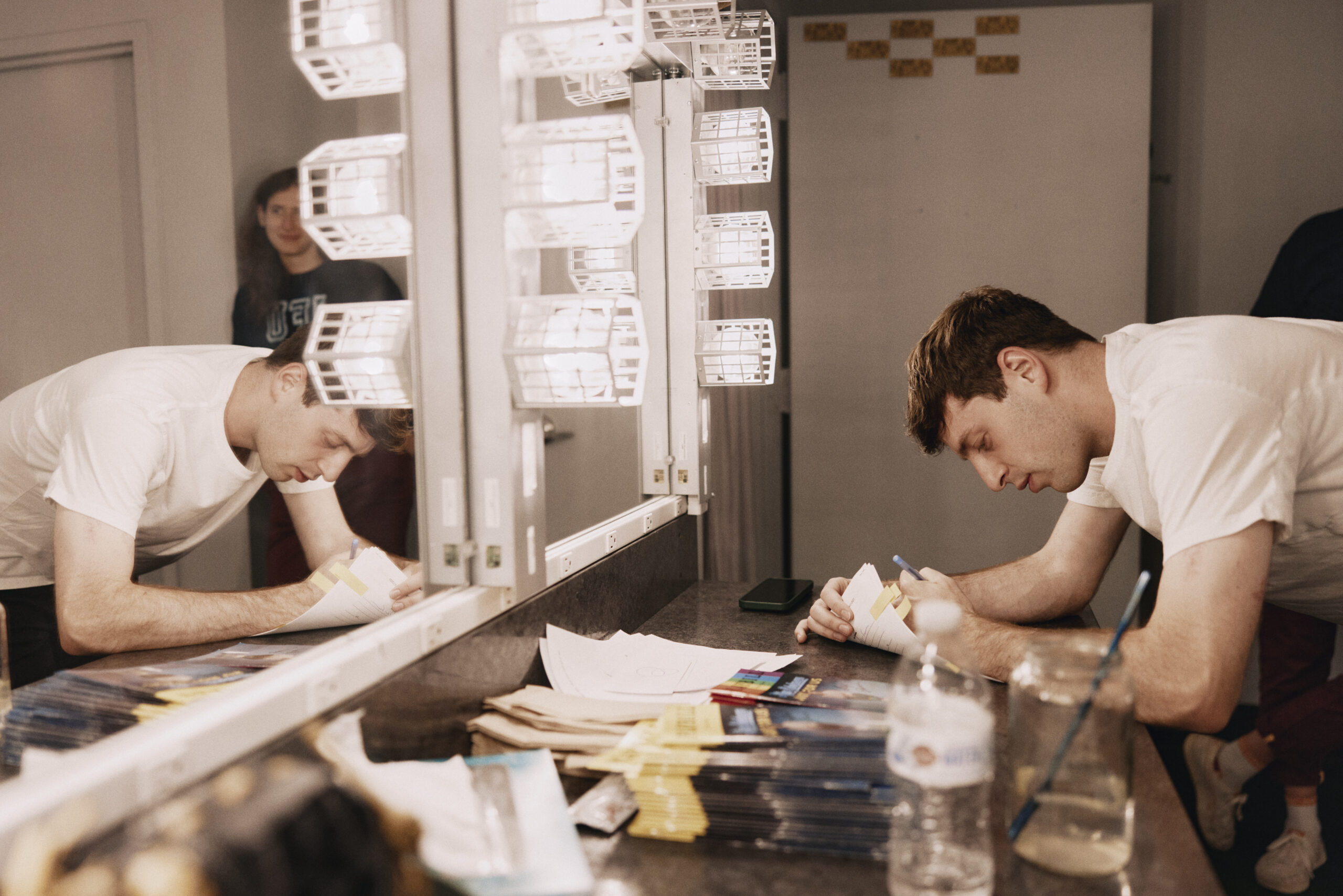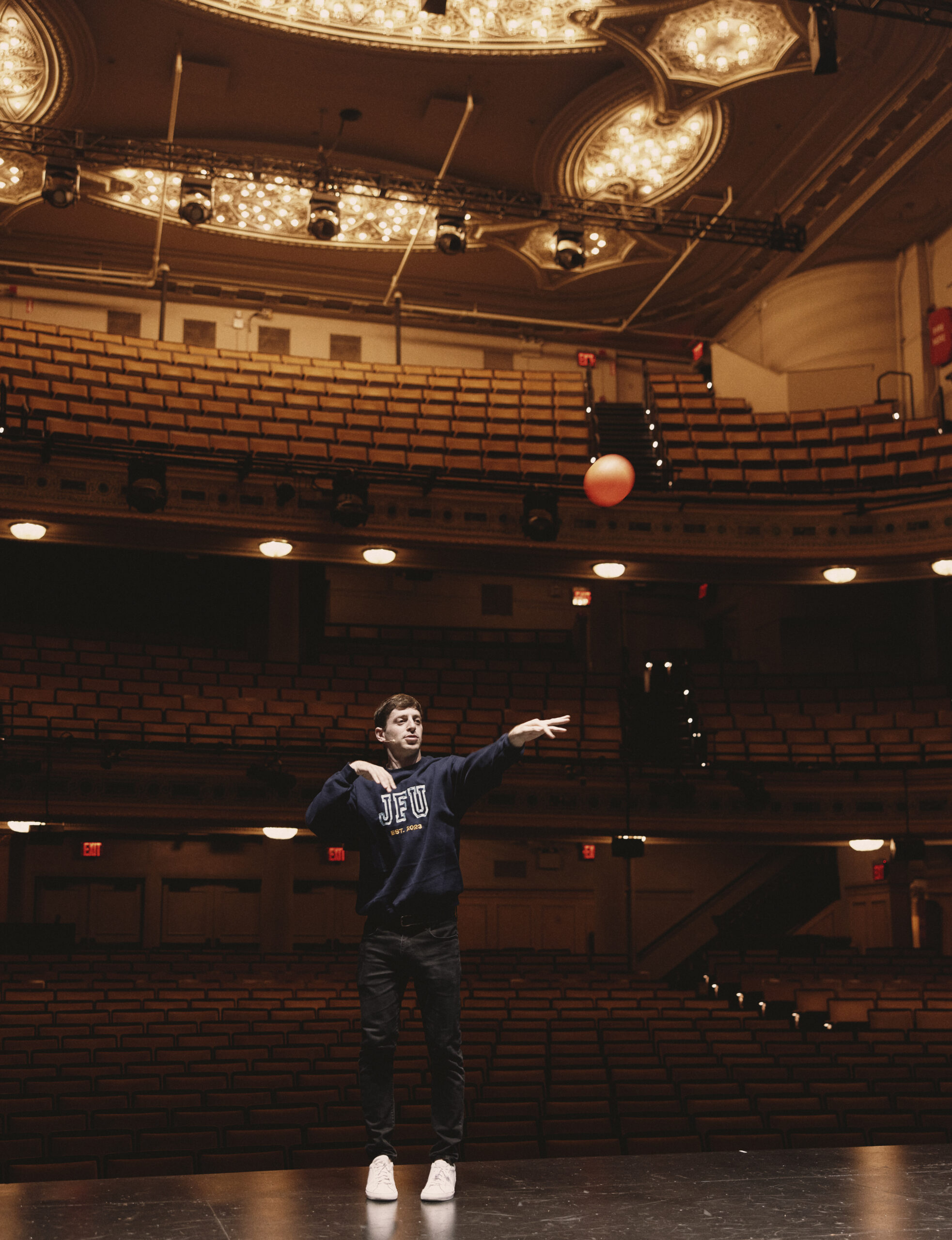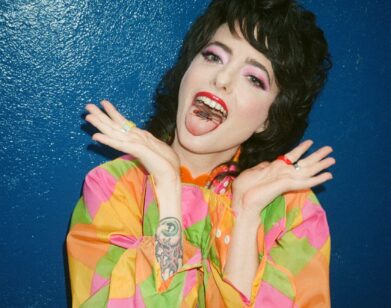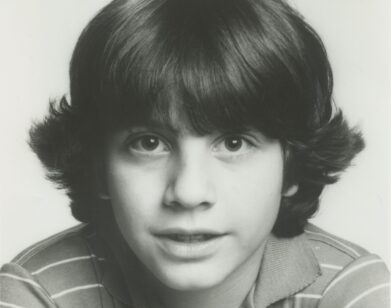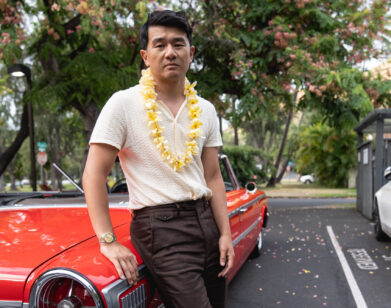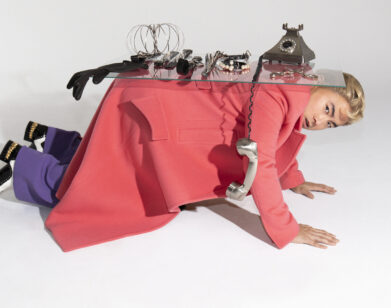LAUGH
“You Made Me Want to Be a Comic”: Alex Edelman, in Conversation With Denis Leary
When it moved to Broadway last summer after successful runs in London, Edinburgh and New York’s own Cherry Lane Theater, Alex Edelman‘s bravura stand-up hour Just For Us was a resounding hit. An uproarious account of the comedian’s infiltration of a white supremacist meeting in Queens, the show found the 35-year-old Edelman working in the illustrious tradition of Jewish comics grappling with their sense of belonging in a world where their proximity to whiteness will only protect them for so long. Somewhat less urgently, Just For Us, which is now streaming as an hour-long special on Max, also places Edelman in a rich lineage of Boston humorists (and includes no shortage of zingers about the comic’s hometown). Among Edelman’s numerous, high-profile fans (Steve Martin, Jerry Seinfeld, and Billy Crystal all offered both notes and praise) is the Worcester-born Denis Leary, who got on a Zoom call with Edelman as he prepared to officially put the show behind him. Below, the two Bostonian funny guys discuss the persistence of anti-Semitism, the death of Edelman’s longtime collaborator Adam Brace, and what comes after mainstream success.
———
DENIS LEARY: Where are you?
ALEX EDELMAN: I’m in New York. At my friend’s apartment, actually.
LEARY: Oh, Mr. Couchsurfer. What is that painting behind you?
EDELMAN: It’s this guy Alex Katz. He’s a figurative portraiture artist. But it’s not mine, it’s my friend’s.
LEARY: Well, it goes without saying that I am your elder in show business. And I’ve walked in your shoes with an off-Broadway show that became a big hit, No Cure for Cancer.
EDELMAN: You’re a huge influence on me. Like, the biggest.
LEARY: Let’s make sure that the audience knows that. Say that again.
EDELMAN: No Cure for Cancer is nearly perfect. But you really made me want to be a comic because you put on this show in Boston where I grew up called Comics Come Home. How would you characterize it?
LEARY: It started because we wanted to build a wing on the hospital at Tufts Medical Center that helped families deal with the situation when one of their family members was going through cancer treatment so that they didn’t have to worry about paying for hotels or any of that stuff, because Cam Neely’s parents both died from cancer and he’d had the experience of how lonely it was, trying to deal with the financial side of it.
EDELMAN: And I went to Comics Coming Home as an early teenager, because I loved the Bruins. But I walked out a comedy fan.
LEARY: If you were even vaguely thinking about comedy in your head, to see Patrice O’Neill and Bill Burr and Brian Regan on the same bill, in a concert setting, must have just made your head explode.
EDELMAN: Every comic was a revelation. For its many faults, there’s something about Boston comedy that is extremely vivid, right? There’s something very colorful and regressive and authentic about Boston comedy that feels really reflective of the city and all of its best and worst qualities. It’s got a toxic masculinity problem. It’s got a racism problem. It’s got a working class versus professional class problem. It’s got the Irish-versus-everyone problem.
LEARY: We grew up in different generations, but that’s been there the whole time, from the beginning of the comedy scene all the way through to today, you know?
EDELMAN: I love Boston and don’t often get a chance to talk about it, but I am really proud of being a Bostonian.
LEARY: Oh, yeah. I watched your special again this morning.
EDELMAN: No way.
LEARY: Yeah, I did. I wake up angry, because that’s my DNA. I need my coffee and some really negative Trump headlines to get me going. This morning I watched your thing and I laughed so hard when I saw it off-Broadway that, watching the HBO version, it struck me how many things I missed because I was laughing so hard. But anyways, there’s that great line that you have, which is, “I grew up in this really racist—”
EDELMAN: “Part of Boston… called Boston.”
LEARY: Which is great. How are you feeling about having it on tape forever?
EDELMAN: It’s sad, man. I worked so hard on this one thing and it’s got all of the experiences tied up. It’s like a chapter of my life.
LEARY: A huge chapter.
EDELMAN: You don’t often get to make something that people seem to like and think is good or think is a must-see. I’ve done solo shows before. Nothing’s ever gone like this. And most significantly, this is the last thing I got to do with my collaborator [Adam Brace], because he passed. I hope I can still sort of access my relationship with that guy, because up until this point, for 11 years, I was in conversation with him. Afterwards he’d be like, “Ah, your tempo’s off” or “you need to enunciate more.”
LEARY: Yeah, but the thing became so successful that now it’s captured for posterity, right? That voice is always going to be in your head. You probably couldn’t have done this performance without him.
EDELMAN: No. But I wish I’d listened a little more closely. Given how big he was in my life, I should have an endless stream of knowledge, wisdom, and memories, you know? And there’s stuff, but it’s not enough to scratch the itch. Sometimes, I’m addicted to how complicated the show feels for me, how it’s really fun, this full expression of myself, but also sad in this way. It feels like the right time to move on, but I’m pretty thrilled with how it came out.
LEARY: The other thing I was going to say, and I’m not just blowing smoke because you know I don’t really give a fuck about this shit. You have created a document which is really fucking funny, but also really serious and touching about fucking anti-Semitism. And because that refuses to go away, this thing is going to live for a really long time. Because 10 years from now, somebody could watch this and go, “Oh, yeah.” Some things, like No Cure for Cancer, can die off a little bit because there’s a lot of pop culture references or whatever. Even though, at the end, that show was about death, right? It was about my dad dying and my son almost dying when he was born, blah, blah, blah. But with your thing, unless anti-Semitism goes away tomorrow—
EDELMAN: Here’s hoping. Here’s hoping.
LEARY: It’s got a power within because the subject matter is evergreen, you know? It’s hatred.
EDELMAN: I haven’t told you about this yet, but three weeks ago I went to go see Louis Farrakhan speak.
LEARY: Oh my god. Where’d you see him speak?
EDELMAN: The Nation of Islam, every year, does this thing called Savior’s Day, which is their biggest holiday. But I went to Detroit to hear Louis Farrakhan speak. He’s like 90 years old and he got up there, at 90, and spoke for three-and-a-half hours. It was all anti-Semitism. It was so bananas that I thought, “Well, as long as this guy’s around…”
LEARY: It’s just crazy. To be 90 years old and hate someone—
EDELMAN: Three-and-a-half hours, man? Good for you. 90 years old.
LEARY: What kind of shape was he in?
EDELMAN: Loose. But there was one moment where he got a little tired and they had to bring a chair up.
LEARY: Unbelievable. I was with a bunch of my Italian and Jewish friends, we had a St. Patrick’s Day cookout. I was the only fucking Irish guy. My assistant was out and about celebrating Patrick’s Day and she saw this sign and took a picture of it, right here in L.A. on a bridge overpass. “Save Ireland from the Jews.” What the fuck?
EDELMAN: I’ve always been sort of an anti-Semitism minimalist in the sense that I’ve always been like, “Ah, It’s not so bad.” Obviously, things become really complicated with Israel and Gaza, which is just a nightmare—
LEARY: Well, I’ll give you some perspective and it’s not necessarily good. My parents are both from Ireland. They came to America on a boat in 1952. The faith and the hope that people would have to get on a boat to come to this country, that’s one great thing. My parents were really liberal and supportive of everybody, especially the civil rights movement. Growing up, my parents always reinforced that. But my mother, she’s 97, was recently talking about how hopeful they felt when they first came to America. Now, she’s just sitting there like, “What? We’re going backwards.”
EDELMAN: By the way, there are still things from No Cure for Cancer—pop culture references, snapshots of a moment—that are timeless. Even in the “Asshole” song, there is a—
LEARY: You want to talk about timeless?
EDELMAN: Yeah, they’re assholes forever. But there’s references to Sam Peckinpah and John Wayne, all that stuff. I remember hearing the song and not knowing any of those references, but I got the vibe.
LEARY: I guess because assholes, of course, live on in our daily lives, people feel like it’s a release valve to sing that song. That was a highlight to my comedy career, to look over and see Marc Maron on rhythm guitar and Bill Burr on drums and you, standing next to me, singing backup vocals. It was fucking awesome.
EDELMAN: It was a bucket list moment for me, which is so cool. Christopher Nolan, when he won his Oscar for Oppenheimer, said “We’re a hundred years into film. Think about how exciting it is to have been a hundred years into theater, a hundred years into painting.” But comedy, or live comedy, standup comedy, is kind of an even younger art form. The access that you have to your heroes is really short. Say you discover someone as a child. That person’s only going to be between 15 and 40 years older than you. So if you try to make a go of it, that’s 10 or 15 years down the line. I saw [George] Carlin live at the Cape Cod Melody Tent. I got to see you and perform with you. Even Mel Brooks, I know a little bit. And Tom Lehrer, he’s 94 years old, but he lives in Cambridge and I occasionally drop in on him. I’m curious, when you were coming up, did you know Bogosian at all? Do you know Spalding [Gray]?
LEARY: Spalding Gray went to Emerson College. When I went to Emerson, I didn’t go there knowing that, but I found out when I got there that that’s where he went.
EDELMAN: Oh, wow.
LEARY: I was in the Emerson Comedy Workshop, which was an original group, all original stuff, original plays, original variety shows. Spalding Gray came and did one of his shows. I remember seeing it and going, “What the fuck is this?” Because he was talking to us, to the audience. There was no fourth wall. I spoke to him separately after the event and that’s when I first thought, “Oh, you could do stand-up and put it in the theatrical setting.” When I went to do No Cure for Cancer and I was trying to find a theater in New York, I called Bogosian and he said, “I’ll tell you what, I’ll come down and see it.” He came to see the show and he said, “I’m going to call this reporter from the New York Times who gave me good reviews and I’m going to tell him to go and see your show.” And the fucking guy came, Stephen Holden, and he wrote the review, which fucking put the show over the top. It changed everything. If I hadn’t seen Spalding Gray, I would’ve never thought you could do stand-up in a theatrical setting. Because I had seen Lily Tomlin’s show, Signs of Intelligent Life in The Universe. That show was brilliant, but I didn’t do characters, and I remember seeing that show and finding it so intimidating.
EDELMAN: There is a great history of solo shows. But the shows that are like, 60 characters—that’s more of a showcase of someone’s acting ability. It’s wonderful, but it’s not me.
LEARY: Well, through the story of anti-Semitism, we get the full breadth of you. We do a round-robin of your life, right?
EDELMAN: Yeah. A lot of my jokes are stories that have happened to me, with details and exaggerations. I started doing it and thought maybe it would be the spine of a show, then it just kind of came together.
LEARY: For example, when you tell that story about how you’re jogging and then you go to the fucking vegan shop—
EDELMAN: Oh my god, yeah. I have not done that joke in maybe seven years.
LEARY: The first time I saw that, it made me fucking howl. The rage at the end of that story.
EDELMAN: Yeah, I can’t even remember the joke. Stand-up based in story has always worked for me. When I started, I was very young, and nobody wanted takes on the world from an 18-year-old, so I was like, “This is something that happened to me.” I developed as a storytelling comedian because I couldn’t be like, “You know what the difference is between men and women?” People will like, “What do you know? You’ve never had either, so shut up.”
LEARY: Well, you’ve got to start thinking about this shit, because this show is ending and you’ve got to write a new show about whoever the fuck knows what. But you’ve also got to expand your palette creatively as an actor, writer, probably filmmaker.
EDELMAN: I’d really like to. That was Billy Crystal’s big advice: “Have your next thing ready as soon as your other thing ends.”
LEARY: It’s not bad advice. But it’s not easy. You’ve set yourself up because of the success of this show, so the next thing should take some time because all eyes are going to be like, “Just For Us part two?”
EDELMAN: I’m trying to have experiences that might lend themselves to that. I didn’t go to see Farrakhan for material, but I’ve always tried to put myself in as many places as I can.

